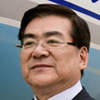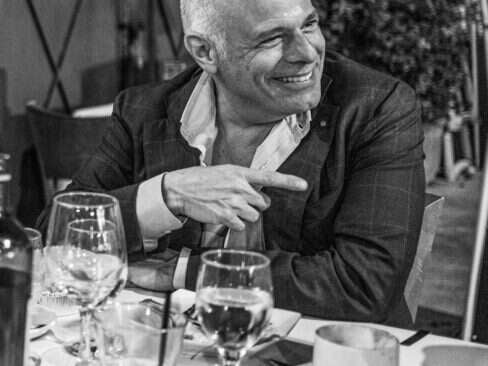
ChairmanKorean Air
In the past decade Korean has elevated itself into a carrier that is getting noticed for both its innovations, expanding network, modernized fleet and greatly improved service and facilities (It’s Concourse A Lounge at its Incheon hub was recently voted Best in Asia/Pacific by Priority Pass). Having last year launched new First Class seating, recently expanded its private jet service to passengers in North America through a partnership with Bombardier Flexjet and adding routes while other airlines were cutting back, Korean Chairman Y.H. Cho took the time to answer some questions from Elite Traveler Editor-in-Chief Douglas Gollan.
ET: Can you give us a brief overview of Korean Air’s history, and also the parent company Hanjin and how you came to control Korean Air?
Y.H. Cho: Korean Air has grown from a small regional airline into a major international aviation company in a little over 40 years. And the parent group, Hanjin, is unique: a major logistics group capable of air, sea and land transport, comprised of 37 companies with 25,666 employees.
It began in 1945 with trucking by Hanjin Transportation. In 1969, Hanjin privatized the state-owned Korean Air, knowing it had the potential to become the international powerhouse it is today.
Korean Air now has the world’s largest commercial airline cargo operation as well as a rank of 13th in the world for passenger transport. Our company is weathering these incredibly challenging times with a renewed spirit of dedication to our principal of Excellence in Flight.
I began working at Korean Air in 1974 and my career has taken me through various departments for more than 30 years including Maintenance, Purchasing, Corporate Planning, IT and Sales. In 1992, I became President. Now, I am Korean Air’s Chairman and CEO as well as Chairman of Hanjin Group. I have an engineering background so I approach each project from an empirical point of view.
ET: Hanjin today is one of the biggest transportation companies in the world. But it was started by your father after World War II. Do you have any early memories of the business as you were growing up?
Y.H. Cho: My father’s first business was trucking and I remember as a child moving toy trucks around our front yard, just as I had seen in the yards of Hanjin. As a boy, I was also lucky enough to have a chance to ride on private planes. It was natural for me to take interest in the transportation business, and it became my dream to one day lead one.
I think my earliest memories of my father’s business were the insights he taught me through his involvements. He always taught me to be frugal and independent. His motivation for business was the devotion to reach his goal. Otherwise, why take the risks?
Watching him work, I was able to learn things that they don’t teach you in classrooms about managing a company: Leadership is one part knowledge, one part courage and one part passion.
ET: Do you ever feel surprised that the business has grown so large and is such a global power?
Y.H. Cho: In this industry, I’m surprised at very little. My vision is for Korean Air to become a respected leader in the world airline industry through products that customers respect and practices that lead. And last year, we served 22 million passengers in 117 cities in 39 countries around the world. We have achieved global status. Our customers have supported our growth, and we continue to thrive. New uniforms, cabin enhancements, fleet orders like the A380 and 787, IT and system upgrades, investments to develop new markets in China and Central Asia, supporting a successful SkyTeam alliance… these are all part of our efforts.
ET: You have been a transformational airline. In the last decade you’ve won awards for passenger service, and contracts from other airlines for maintenance work. Can you tell us a bit about this transformation?
Y.H. Cho: As you know, the airline industry is one of the world’s most competitive businesses and an airline must continually transform itself to keep that edge. The primary force driving Korean Air’s transformation is our mission, Excellence in Flight, which aims for excellence in service, operations and innovation.
I guess the transformation was best symbolized by our look…our uniforms are the first and only crew gear designed by the late Gian Franco Ferre. Our aircraft interior colors were softened and our whole attitude was enhanced.
From a passenger point of view, we need to constantly transform ourselves to meet market demands. We continue to upgrade our seats, and our passengers are offered a broad array of entertainment and meal options, recognized and praised by frequent travelers and media worldwide.
We expanded our maintenance business in 2004 to create a new profit center. We now have a number of major contracts with aviation leaders such as United, Delta, Air France, JAL, China Eastern, Pratt & Whitney and U.S. Air Force. With 4,100 skilled engineers working in four maintenance bases in Korea, this business supplements our airline operation and contributes to our overall strength.
Korean Air is unique in the industry, operating a successful aerospace business along with passenger and cargo transportation. With over 30 years of know-how, we design and manufacture aircraft parts for clients such as Boeing and Airbus, as well as build satellites and unmanned aerial vehicles (UAV) for the government.
ET: Korean Air recently introduced new first class and business class seating. What’s the goal in terms of customers? Do you want to be in the same league as Cathay Pacific and Singapore Airlines? Do you feel KE is already there?
Y.H. Cho: To be a respected leader in the world airline industry, we must provide products that our customers appreciate. It’s not the aircraft but the cabin environment and service attentiveness that make the difference. We strive to provide our customers with an experience to which they’ll return.
We’re doing this through our mission…Excellence in Flight…that supports the superior service, innovation and dependable operations that give Korean Air an edge over the competition.
We’re constantly upgrading our premium seats to reflect and lead the changing customer needs and what I can say for sure is that our cabin environments meet or beat our competition. For example, our new First Class seat, Kosmo Suites, have been complimented by one of the leading global aircraft manufacturers as the best First Class seat they have ever experienced during seat installation process. Kosmo Suites seats, firstly introduced on our new B777-300ER last year, are roomy and comfortable yet private and functional. Also, our new Prestige Sleeper seats in Business Class are now 180˚ fully lie-flat.
Our wine lists are consistently ranked top “Cellars in the Sky” and feature vintages from around the world. Our meals are served on Wedgwood and our champagne and caviar service is on demand… you can enjoy them for breakfast if you choose.
ET: Are first time passengers surprised at the level of service today’s Korean Air provides in First Class?
Y.H. Cho: Thank you for noticing.
We invest heavily in customer service, including training programs that cater to the diverse needs brought on by the varied cultures and personal preferences of our passengers. And our customers appreciate this kind of attentiveness.
In terms of hardware, our fleet is comprised of new aircraft featuring comfortable cabin environments with the most advanced seating product, carefully selected amenities (service items), and a broad array of entertainment options.
Our attention to detail is pretty amazing…especially for our First Class passengers. Our flight attendants are some of the best trained in the world. They know just how much attention is enough attention. Award-winning meals and wine are provided whenever you want them and there are a number of options.
Privacy and service are something in which we really excel. For example, we’re happy to meet our First Class passengers at the plane and personally guide them through Incheon to make connections. This can be very helpful if this is the traveler’s first time through Incheon. Baggage wrapping service we offer to our First Class customers at check-in is also welcomed by customers.
ET: Lufthansa and Qatar Airways have both introduced successful programs where they offer private jet services, and now Korean Air has joined the game in partnership with Flexjet and JetSolutions. Can you tell us a bit how it’s going and what your future plans are?
Y.H. Cho: Korean Air has its existing private jet service utilizing its Gulfstream aircraft to provide service between Korea domestic cities, Japan, China and South East Asian countries. Now, this newly launched ‘Flexjet Connect’ program expands the service area to over 5,000 destinations in the American region, in a more efficient way with combinations of Korean Air long-haul regular flights and point-to-point private jet flights. With this program, Korean Air passengers obtain guaranteed access to more than 5,000 U.S. airports from our 12 North American gateways on a fleet of high-performance Bombardier business jets, operated by U.S. air carrier, Jet Solutions.
ET: Many airlines are scaling back on expansion, but your plans seem very aggressive. What is on your agenda in terms of new routes, aircraft orders and other growth?
Y.H. Cho: We view challenges as opportunities and know that tough times are the best time to invest.
That is why, even in 2009, Korean Air launched new passenger service to Xian and Mudanjiang in China and Shizuoka in Japan, as well as new cargo service to Hanoi and Lulea. And in Uzbekistan, we are working with the local government to develop a Central Asian logistics hub that will serve an intensely growing market.
There’s a constriction in the industry, where only the strong will survive. And I predict that our industry will continue to be in flux for many years to come. That means that flexibility and planning for any inevitability are keys to success, and that’s something both Korean Air and Hanjin are very adept at.
For the several years upcoming, we are planning to introduce new generation aircraft for both improved customer service and higher operational efficiency. Adding such aircraft to our fleet including A380 and B787 Dreamliners will also contribute to our efforts to preserve a green environment.
ET: Incheon has received a lot of positive feedback as your hub and as a connecting point to the rest of Asia. For readers who haven’t been there, why would you say Incheon is a good place to make a connection?
Y.H. Cho: Incheon is a great place to connect. It’s in the best possible location between the Americas and Asia. In only seven years after opening in 2001, more than 30 million people visit the airport annually and more than 50% of the air cargo volume is transit. It has been rated as the best airport in the world by the Airports Council International for five consecutive years since 2005.
It’s constantly being improved and expanded. It’s considered by frequent travelers as one of the world’s best airports because there’s something for everyone: designer shopping, cultural centers, restaurants, gift shops, and much more.
In 2009, more than 5 million travelers transited through Incheon, and Korean Air carried 68% of those passengers. Our transit time between gates is a comfortable 45 minutes and from there, travelers can connect to more than 20 cities in China, a dozen in Japan and dozens of others. Our lounges are true oases with meals catered by the nearby Hyatt Regency, relaxing facilities, and all the business needs that road warriors require.
ET: Korean Air is a founding member of the global alliance SkyTeam. For the past ten years, SkyTeam has grown in terms of its size as well as customer services. In which aspect has Korean Air contributed to the development of SkyTeam?
Y.H. Cho: Since Korean Air launched SkyTeam alliance with three other founding airlines in 2000, we have put our efforts to recruit the value-creating members that can compliment the alliance network and increase synergy within SkyTeam to enhance customer benefits. The mutually beneficial cooperation within SkyTeam has allowed us to accomplish remarkable outcomes in the aspects of service quality as well as global market presence.
As a sole founding member in the Asia region, the world’s fastest growing market, Korean Air took a leading role in recruiting China Southern Airlines in 2007 and Vietnam Airlines this year. In addition, we will have China Eastern Airlines as a new member in June 2011. Korean Air is very proud to be taking a critical role in raising the value and brand awareness of SkyTeam in Asia. Through the cooperation amongst Asian members, we would like to offer more benefits and products to the customers who travel in Asia.
ET: Hanjin has recently announced the redevelopment of its Wilshire Grand Hotel in downtown Los Angeles. Why are you planning a new hotel and office tower now?
Y.H. Cho: Current economic downturn has discouraged many companies to reduce, delay or cancel investments. We, Hanjin Group, however, have decided to make investments in times of economic distress to prepare for the time after this downturn.
So, this is the right time to invest in downtown Los Angeles. The Wilshire Grand development is perfectly located to be the northern anchor of the Figueroa entertainment corridor that’s anchored by Staples Center and LA Live to the south. The project features a 45 story hotel and condominium tower and a 65 story office tower…the first new Class-A office space to be built in downtown LA in 20 years. Plus there’s open space, retail and restaurants. It’s going to reinforce the iconic stature of the corner of Wilshire and Figueroa.
Los Angeles is important to us because it’s the Americas headquarters for both Korean Air and Hanjin Shipping. Our shipping company has a sizeable operation out of the port of L.A. and we’re the largest airline to Asia from L.A International Airport. In fact, some reports show Hanjin Shipping’s and Korean Air’s business in LA area supports more than 35,000 jobs, generating over $4 million in state and local taxes.
ET: Outside of work, do you have any hobbies or passions you like to pursue?
Y.H. Cho: I have loved to travel since I was very young. When I was in high school in the U.S., I once hit the road for a week with just a map in my hands. I enjoy traveling around the U.S. with friends and family. You don’t really know about a country and its people until you get into the back country, and that’s what I’ve been doing for many years… traveling the back roads and rural highways, enjoying America.
I also like to visit places that Korean Air doesn’t reach yet. Adding to the joy of seeing new places, I also check to see if it’s a market worth developing. Some of Korea’s favorite tourist destinations were developed like this… Vietnam’s Halong Bay, Huangshan in China, Istanbul, Fiji…
My other passion is photography, and I’ve traveled the world, and sometimes above the world (in aircraft) taking photos with which I’m pleased. Photography is fascinating because the camera lens shows you the world without prejudice. But it also lets you determine your own angle or view. Each year, I make a calendar with my photos and send it to my friends as a New Year’s gift.
ET: You have recently been appointed as an Ambassador of Peace and Sport – What does this role entail? And how active are you in the field of sports?
Y.H. Cho: In February, I was appointed the 10th official Ambassador for Peace and Sport, and the first from the Asian continent. It is great honor to become an Ambassador for this great organization.
Korean Air was the official airline for the 1988 Seoul Olympics and 2002 Korea-Japan FIFA World Cup, and for years we’ve been contributing to the global sports industry through various sponsorships and initiatives.
I’m currently Chairman of the Korea Table Tennis Association and East Asia Regional Vice President of the Asia Table Tennis Union. I encourage the exchange of knowledge and skills of Korean table tennis with countries such as China, Russia and Sweden. We have table tennis facilities permanently set up in an area overlooking our maintenance hangar at our headquarters at Gimpo, and everyday you’ll see employees enjoying the game during lunch and breaks.
Through our “Excellence Program,” Korean Air sponsors select talented enthusiasts who raise the nation’s profile in the global world of sports, culture, social services and academia. Sports celebrities who have been entered into this program include figure skating queen, Yuna Kim; Ji-ae Shin, the 2009 LPGA Rookie of the Year; Tae-hwan Park, the Beijing Olympic gold medalist swimmer, and more.
ET: Korea is considered right now an attractive investment opportunity. As the readers of Elite Traveler are C-Level executives and owners of successful businesses, what advice would you give them if they were interested in establishing a base in Korea?
Y.H. Cho: Korea is a great place to do business. It is located within three hours from 60 cities populating over one million people each, so business opportunities are endless.
The Korean government is supportive of foreign businesses working in Korea and offers incentives such as tax reduction and relaxed regulatory restrictions for foreign investors. And Korean businesses and enterprises are always looking for strategic partnerships that produce strong returns on investments.
ET: As we talked about earlier, Korean Air has realized a pretty dramatic turnaround. For any readers who are running challenging businesses, any advice you would share on how to get them back on the right track?
Y.H. Cho: In times of crisis, the best advice for a challenged business and its executives is to have the ability to realistically assess the situation and the courage to make timely decisions. It’s easy to say “Turn risks into opportunities for investment,” but a leader must think smart and quickly make decisions in hard times. After 9/11, airlines retreated. But we anticipated the industry would spring back in two to three years and decided to go ahead with investments. They’re paying off.
Tenacity and bravery usually win out. But you need to be realistic as well. Abide by core principles but be flexible and nimble enough to change as markets shift.
As I’ve said, we’re pursuing Excellence in Flight through service, innovation and operational expertise. This is what successful companies strive for and achieve. It’s what Korean Air is made of.












